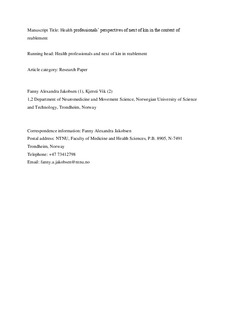| dc.contributor.author | Jakobsen, Fanny Alexandra | |
| dc.contributor.author | Vik, Kjersti | |
| dc.date.accessioned | 2019-04-23T14:52:59Z | |
| dc.date.available | 2019-04-23T14:52:59Z | |
| dc.date.created | 2019-01-10T13:35:53Z | |
| dc.date.issued | 2018 | |
| dc.identifier.citation | Disability and Rehabilitation. 2018, 1-8. | nb_NO |
| dc.identifier.issn | 0963-8288 | |
| dc.identifier.uri | http://hdl.handle.net/11250/2595122 | |
| dc.description.abstract | Aim: To describe health professionals’ perspectives of next of kin in the context of reablement.
Methods: A total of 49 health professionals from different organizational levels participated. Their ages, genders, experiences, and professions varied. A total of 10 focus group discussions were held in two municipalities. The data analysis was conducted using a constructivist grounded theory approach.
Results: The core category was identified as negotiating between themselves. Two categories captured the different dimensions of the core category: facing a dilemma with next of kin in reablement and ambiguous motives for collaborating with next of kin.
Conclusion: In collaboration with next of kin, it is important for health professionals to be aware of and manage the possible differences in expectations and opinions concerning reablement. Health professionals need to acknowledge that next of kin can be a source of support for older adults. They also need to take into consideration that next of kin may need support, information, and education associated with their roles as next of kin to older adults.
Implications for rehabilitation:
- Health professionals need to be aware of how they collaborate with next of kin and what they expect of them.
- There is a need for health professionals to find a routine in how next of kin can become partners in reablement without compromising the older adult’s autonomy.
- This study contributes to further awareness of the different roles of health professionals and next of kin regarding expectations of reablement.
- Health professionals may benefit from providing a more family-centred approach by taking into account that next of kin can be a resource in reablement. In addition, they need to take into consideration that next of kin also have their own needs and must be respected. | nb_NO |
| dc.language.iso | eng | nb_NO |
| dc.publisher | Taylor & Francis | nb_NO |
| dc.title | Health professionals’ perspectives of next of kin in the context of reablement | nb_NO |
| dc.type | Journal article | nb_NO |
| dc.type | Peer reviewed | nb_NO |
| dc.description.version | acceptedVersion | nb_NO |
| dc.source.pagenumber | 1-8 | nb_NO |
| dc.source.journal | Disability and Rehabilitation | nb_NO |
| dc.identifier.doi | 10.1080/09638288.2018.1450452 | |
| dc.identifier.cristin | 1654150 | |
| dc.description.localcode | This is an Accepted Manuscript of an article published by Taylor & Francis in Disability and Rehabilitation on 15.3.2018, available at https://www.tandfonline.com/doi/full/10.1080/09638288.2018.1450452 | nb_NO |
| cristin.unitcode | 194,65,30,0 | |
| cristin.unitname | Institutt for nevromedisin og bevegelsesvitenskap | |
| cristin.ispublished | true | |
| cristin.fulltext | original | |
| cristin.qualitycode | 1 | |
